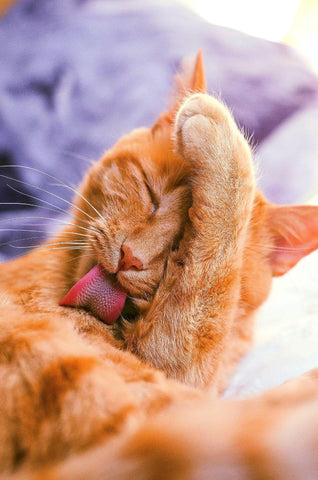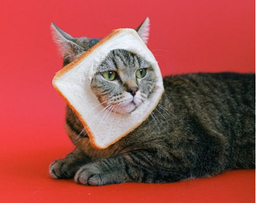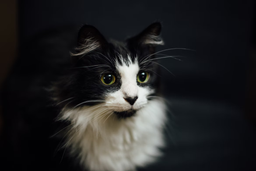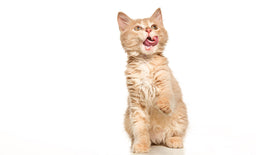Why is my cat throwing up undigested food? What can I do about it?
A cat’s overall wellness largely depends on their diet and gut health. Almost all feline illnesses, benign or severe, start with vomiting. What about a cat throwing up undigested food? Is it a minor little hiccup resulting from your naughty kitty eating something they shouldn’t, or is it a legitimate cause for concern?
If your cat throws up undigested food, it’s not technically vomiting but regurgitation. Vomiting activates stomach muscles to forcefully push out digested or partially digested food, often mixed with bile.
Regurgitating is a relatively passive reflex function where the undigested contents of the stomach or the oesophagus pop out as a mucousy spherical or cylindrical mass, usually soon after swallowing.
Frequent regurgitation is inconvenient (and unattractive) for you and your cat. To alleviate the problem, you must determine its root cause.
Why do cats throw up undigested food after eating?
Figuring out why cats retch and throw up undigested food is a classic whodunnit game. From harmless hairballs to unknown metabolic diseases, the suspects are sneaky and numerous. Let’s look into the most common factors triggering this issue.
Poor eating habits
Particular eating habits create undue pressure on the digestive tract, causing food to be automatically thrust outwards. They are as follows:
- Eating too much too quickly—Kitties who devour more food than they can handle experience a stretch reflex in their stomach, making them regurgitate their meal right after eating. Gorging is often associated with a poor diet and an inconsistent feeding schedule, but pregnant cats or felines who suffer from diabetes or hyperthyroidism also have a voracious appetite
- Excessive movements after eating—Cats digest well when they relax or take a nap after eating. Intense post-meal activities create turbulence in their digestive system, causing regurgitation

I don’t particularly enjoy these nasty barf sessions, hooman. Can we do something about it?
Source: Holly Ireland
Eating hard-to-digest or toxic food
The feline digestive system tries to eliminate hard-to-digest or toxic food as a natural defence mechanism. The regurgitation response will vary depending on the ingested amount and your cat’s immune response. Check out the table below for examples:
|
Food with low digestibility |
Toxic food |
Intestinal blockages
Cats often throw up undigested food to clear intestinal blockages caused by:
- Hairballs
- Gnawing non-edible items like wool, carpet, tissue paper, and plastic toys
- Swallowing splintered cooked bones
- Consuming any other foreign object
It’s usually easy to spot the indigestible item in the vomit. If your kitty gags continuously but cannot throw up, get them to the vet to check critical intestinal or throat blockages.
Allergy flare-ups
Regurgitation is a common allergic reaction in cats, often accompanied by other symptoms like bloating, wheezing, itchy skin, hair loss, loss of appetite, and inflamed eyes. Here are some common types of food that may trigger allergies in cats:
- Milk and dairy products (cheese, yoghurt, ice cream, etc.)
- Gluten-rich products like bread and wheat pasta
- Nuts and peanut butter
- Particular meats (e.g. beef)
Gastrointestinal issues
Gastrointestinal problems like constipation, intestinal parasites, and irritable bowel syndrome (IBS) make your kitty feel bloated and nauseous all the time. Progressed gastrointestinal conditions also cause inflammation and infections in the digestive tract, which leads to the throwing up of undigested food.
Changes in diet or feeding regime
Some cats can be extra-sensitive to what they eat, and sudden meal changes can cause stress. If you alter their regular meals or feeding schedule out of the blue, food rejection or regurgitation can be a hostile psychological response to the change. In such cases, nutritionists recommend a gradual transition to ensure your kitty doesn’t feel threatened by a new diet or feeding regime.
Medical conditions
If the above issues don't apply to your kitty, take them to the vet for a proper medical evaluation. Several feline diseases can trigger the regurgitation reflex, including:
- Hypertension
- Metabolic diseases
- Neuromuscular disorders
- Addison's disease
- Inflammation or enlargement of the oesophagus
- Congenital diseases
- Tumours
The following symptoms are also associated with severe regurgitation—fever, lethargy, diarrhoea, weight loss, bad breath, difficulty swallowing, a tender and swollen neck, and weird breathing noises.

Sulky or sick? Is your kitty sleeping too much or displaying signs of pain? Maybe this calls for a drive to the vet.
Source: Jospeh Almendarez
Regurgitation in cats after eating—is it normal, or is their food inadequate?
Many cat parents think that regurgitating food after a meal is normal and that there's no reason for concern. The truth is, cats don’t usually throw up food unless they are sick or have eaten something odd.
Regurgitating once or twice a month is tolerable, but if your kitty throws up undigested food every other day for no apparent reason, you should reconsider their existing diet.
Cat regurgitates undigested dry food
Regurgitation is common in cats on a dry food diet. Kitty biscuits are heavily processed and contain several stomach irritants like sugar, grains, binding starch, chemical preservatives, colours, and flavour enhancers, which cause stomach sensitivity and increase the risk of regurgitation.
Many vets have pointed out two specific reasons why cats throw up undigested kibbles:
- Overeating then throwing up—Most biscuits have lower protein and higher carb content than wet food, so kitties tend to eat a lot of dry food to feel full. Biscuits absorb the digestive juices in their stomach like a sponge and then expand, triggering the reflex to expel the uncomfortable food
- Not chewing—If you’ve observed how cats eat, you’ve probably noticed that they often don’t chew biscuits but swallow them whole. The feline digestive system may have a hard time breaking down the coarse texture of sturdy kibbles. This problem is more evident in older cats with no teeth and weakened digestive abilities
If your kitty is throwing up dry food, switch them to regular wet food meals. In case they are fussy about the change, give them a combination of wet and dry food for a few days and gradually phase out the biscuits.
Cat throws up undigested wet food
Cats usually don’t throw up undigested wet food as it’s close to their natural diet, but if they do, check the label for potential inappropriate ingredients. They can be:
- Hard-to-digest carbohydrates—Cats do not need carbs in their meals as they get the necessary calories from proteins and fat. Ideally, wet food should have nothing but meat, although some manufacturers use harsh, starchy grains like corn and rice as fillers that trigger regurgitation. Carbs in cat food can also lead to obesity and feline diabetes
- Artificial additives—Some manufacturers use iffy chemical additives to improve the taste, texture, appearance, and shelf life of wet food. Such ingredients disrupt the natural pH balance of the feline digestive system and cause nausea
- Inadequate proteins—Protein from meat is the only viable source of amino acids for felines. If wet food contains vegetable or dairy protein, your kitty may react badly to it. The same goes for meat derivatives
If you think your kitty’s current wet food causes tummy upsets, switch to a grain-free wet food with whole meat and organs.
Stick to the basic hygiene protocol to keep wet food from spoiling. Make sure to:
- Serve the meals in clean dishes only
- Throw away any leftovers plated for over four hours

Why do cats vomit undigested food with hairballs? Well, it’s collateral damage if you’re dealing with an over-enthusiastic self-groomer!
Source: Valeria Strogoteanu
What should I do if my cat keeps throwing up undigested food with hairballs?
If your kitty throws up hairballs and undigested food, it’s often a sign of low-quality proteins in their diet.
Most cats get hairballs because they overdo their grooming sessions. If their regular meals lack quality proteins, their fur roots will weaken and come off with a single lick, consequently getting ingested in the process and piling up as hairballs in your furry friend’s stomach.
Proteins like keratin and collagen form the fibrous structure of hair and nails in felines. Cats specifically need animal proteins containing crucial amino acids, like taurine and arginine, that cats cannot synthesise. These amino acids work as antioxidants and boost cell regeneration and collagen production in cats, promoting fur health.
If you want your kitty to have fewer hairballs and prettier fur, give them high-protein food with taurine-rich meat such as chicken breast and liver, duck, pork, salmon, tuna, and shrimp.
You can also reduce hairballs by brushing your kitty’s coat at least two times a week, especially if you’re dealing with breeds prone to shedding, such as Ragdolls, Persians, Bengals, Siamese, Maine Coons, and British Shorthairs.
Is your cat regurgitating undigested food too often? Switch to Untamed
Is your furry companion suffering from frequent bouts of heaving and puking out whole chunks of food? If you’re looking for a permanent solution, nothing can be more effective than upgrading their diet.
Choose Untamed because our gravy and jelly products add highly digestible whole meat proteins to your kitty’s meals. We only use the prime cuts of human-grade whole meat and organs to keep our products free from common stomach irritants and fillers like meat derivatives, coarse grains, vegetables, and sugar.
Our food supports the feline digestive system because we:
- Offer quality animal proteins—Untamed products have twice more protein than the industry standard. Our meals help reduce hairballs and improve your kitty’s muscle, bone, and dental health
- Use gentle cooking methods—We steam our food to preserve the nutritional value, aroma, and texture. The meat chunks are tender and tasty, while the bioavailability of all nutrients stays intact
- Provide balanced nutrition—Our recipes have been designed by vets to ensure your kitty's diet is complete and balanced. Our food is rich in top micronutrients like taurine and vitamin E. You don’t have to worry about vitamin or mineral deficiencies as long as your cat is on Untamed
- Choose only hypoallergenic ingredients—We keep our products free from all known allergens, chemical preservatives, and iffy taste enhancers that can destabilise your cat’s natural digestive process
Our catalogue includes chicken, duck, ham, mackerel, tuna, sardine, salmon, and shrimp—all taste-approved by the fussiest of eaters!
Click here to take our TRY NOW quiz and order a trial taster pack at an excellent price!

Food accepted and loved by kitties and their tummies—Untamed tames digestive troubles with the power of superior nutrition!
Image (c) Untamed
Make your cat’s life more fun with Untamed
Untamed works for cats of all breeds and ages. Here’s how:
- Kittenhood—Once weaned off, kittens need a high-calorie diet based on meat protein to gain muscle and hit their ideal weight. Untamed is perfect for growing kittens as our hypoallergenic meals provide supreme nutrition without triggering gastrointestinal episodes
- Adulthood—Adult cats, especially sterilised ones, tend to gain weight quickly due to a relatively sedentary lifestyle. Untamed’s low-fat recipes are perfect for weight management. Whether your kitty needs to gain or lose weight, you can easily manage their diet by controlling the number of Untamed cans they have in a day. Our food also helps in preventing common diseases like diabetes, arthritis, cystitis, and bladder stones
- Old age—Senior cats have a decreased appetite due to their slowed metabolism, which can make them haggard and weak. Our immune-system-boosting and easy-to-digest meals suit older cats and help them retain their weight
Our clients have noticed improvements in their kitty’s quality of life after switching to Untamed. Here’s what they say:
|
Timeline |
The Untamed effect |
|
One week |
|
|
Two months |
|
|
Four months and beyond |
|
If your kitty is regurgitating way too much, start with our single-protein meals tailored to the needs of cats with sensitive stomachs:
- Chicka Chicken in Gravy
- Chocka Chicken in Jelly
- Tuck-in Tuna in Gravy

Our aromatic food will entice your kitty the moment you pop a can open!
Image (c) Untamed
Get regular Untamed supplies delivered to your doorstep
If you value a straightforward approach, you’ll love the effortless online cat food shopping experience we offer! To get your first Untamed pack, all you have to do is:
- Complete our TRY NOW quiz and give us deets about your kitty
- Pick a meal plan
- Place your order
You’ll receive your order in a day. If your kitty likes our meals and wants more, we’ll send monthly supplies of Untamed to your doorstep—our cat food delivery subscription comes with free shipping! You’re in complete control of your orders—modify, cancel, or postpone them at your convenience. Our products come in eco-friendly aluminium cans with a three-year shelf life. They don’t require additional heating or freezing!
Untamed is all about ethical food production. Our packaging is 100% recyclable and sourced from cruelty-free and sustainable providers.

Surprise your kitty with Untamed delicacies? We won’t let you down!
Image (c) Untamed
My cat vomited undigested food hours after eating—should I worry?
The regurgitation episode usually happens right after eating, but don’t be too alarmed if your cat throws up undigested food hours after their meal. Delayed regurgitation mostly happens because of hairballs or other foreign objects in their tummy. Their digestive system tries to work with what it has but eventually gives up and eliminates the problem.
Stress is another major cause of delayed regurgitation, and continual stress and anxiety can make cats physically sick. Over-agitated felines experience stomach cramps, nausea, diarrhoea, and vomiting. You should deal with the stressors to fix the issue.
How to help stressed cats throwing up undigested food
If you think your cat is throwing up because of stress, here are some tips to follow:
- Determine the stress source. Social or environmental changes, lack of human affection/attention, or an underlying illness are typical stressors for cats
- Keep them engaged in various games and activities, especially if they stay indoors and appear bored and fidgety all the time
- Give them constant access to fresh water and a warm bed to make them feel safe
- Make sure they are relaxed before and after their meals
- Stroke and comfort them while they eat
- Pick a convenient feeding schedule and stick to it every day (consistency and familiarity help cats feel secure)
- Learn to read your cat’s body language and react promptly if they show signs of discomfort or fear

I used to be anxious, but now I’m a zen kitty with zero stress because I know my dorky hooman cannot get by without my undeniable charm and comforting presence.
Source: dasha shchukova
Why is my cat eating the vomit?
If your cat eats their vomit containing undigested food, it’s probably because it smells the same as their regular meal. Cats judge food by the smell and eat anything with an enticing aroma. Don't let them ingest anything they've already thrown up because their body eliminated it for a reason. The vomit probably contains hairballs and other icky stuff. Vets recommend cleaning up your kitty’s mess immediately so they don’t feel tempted to dig in.
Be extra careful if your kitten puked
Like adult cats, kittens can also throw up because of overeating or indulging in raw meat. Younglings have a low body mass and tend to lose their strength pretty quickly whenever they throw up or have diarrhoea. If your kitty is vomiting frequently (whether digested or undigested food), consult a vet immediately.
In case your kitten is losing a lot of fluids, give them an unseasoned meat soup or a bone broth to prevent dehydration. You can also offer them a homemade meal of chicken and rice till the issue is over.

![Best food for Ragdoll cats in the UK [Broken Down]](http://untamed.com/cdn/shop/articles/featured_best_food_for_ragdoll_cats_uk.jpg?v=1646818249&width=256)

